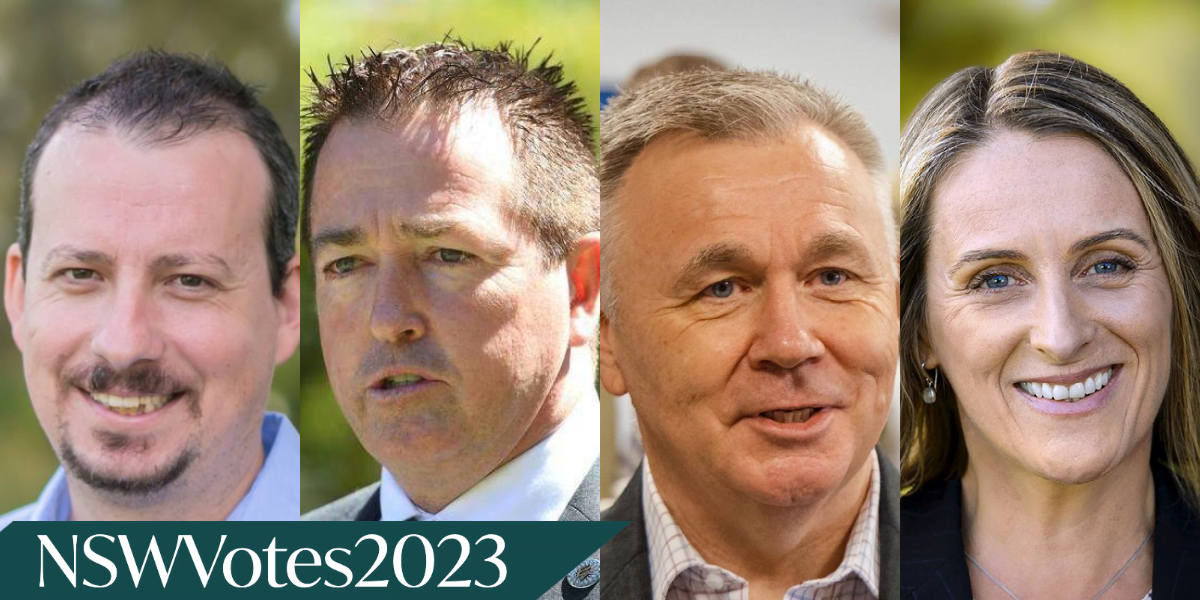Over 50 people braved the thunderstorm last night to attend the NSW Farmers election debate in Armidale, where representatives of the National, Labor, Greens and Shooters, Fishers and Farmers party agreed on the issues but offered little in the way of solutions.
National Party leader and Deputy Premier Paul Toole, Shadow Minister for Agriculture and Regional NSW and Labor upper house member Mick Veitch, Greens spokesperson for rural issues Sue Higginson, and Mark Banasiak from the Shooters, Fishers and Farmers participated in the debate moderated by NSW Farmers. Health, education, and land use conflict dominated the discussion, with a lot of consensus about the seriousness of the issues facing regional communities.
There was a lot of talk about money and good recognition of the issues, but few solutions on offer during a wide ranging debate focused more on health and education than agriculture.
Sue Higginson, a farmer herself, has only been in parliament six months but was very critical of the pork barrelling and performance record of the current NSW Government.
“Investment by the Nats into flashy health and education infrastructure has actually failed to meaningfully close the gap between the cities and the regions.”
“Regional patients and students are left without the essential workers to staff schools, TAFE, and health services,” she said.
Mick Veitch, who has been dropped to an unwinnable position on the upper house ticket by the Labor Party, raised the issues on the workforce shortages, saying that we are starting to have shortages in occupations like baristas and bus drivers that he thought would never be the case. He also raised the issue of fuel security and rising input costs for small business and farmers.
Housing affordability was one of the specific questions put to the panel, with broad agreement that it is a significant issue. Mark Bosniac was critical of local government and planning laws restricting supply.
“If you want to deal with housing affordability, whether it’s buying or renting, you have to deal with supply,” he said.
Paul Toole said it’s not possible to build new houses overnight, but we do need a plan for how we’re going to get more housing built as quickly as possible.
“It has to be done with all layers of government working together,” Mr Toole said.
Ms Higginson said we need to be looking at a rent freeze, and stop seeing housing as a profit generating exercise.
Mr Veitch said 1.3 million people are now in housing stress, and agreed with Mr Toole that all three tiers of government have failed in some way on housing.
Roads were also raised a significant issue but there was little disagreement about the need to fix the roads.
Land use conflict was the most impassioned topic, with Rosemary travelling from the Liverpool Plains raising their continued fight against Santos. Multiple questions were asked about the New England Renewable Energy Zone (REZ), and whether the cost to the environment and communities was a reasonable price to pay.
“Renewables do cause considerable conflict in local communities,” said Mr O’Toole.
“There is a problem when neighbours aren’t talking to each other after being family friends for decades, that says to me there’s something seriously wrong with the planning system.”
Three of the four parties supported the idea of an independent land use commissioner to resolve the conflicts between agricultural production and developments. Mr Veitch said land use conflict is raised with him wherever he goes across the state, whether it be renewables, powerlines, or other developments. “We need someone to work through all of that.”
Kathy Rankin, policy director of NSW Farmers, said she understood it was difficult for candidates to offer specifics in the context of an election campaign.
“What matters is what they do when they get elected,” she said.
The NSW election will be held on March 25. The video of the debate is available on the NSW Farmers Facebook page.
Got something you want to say about this story? Have your say on our opinion and comment hub, New England Times Engage


